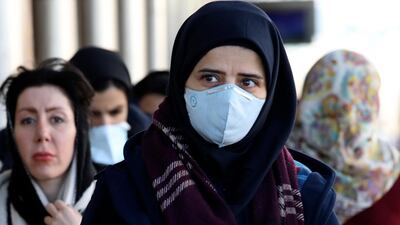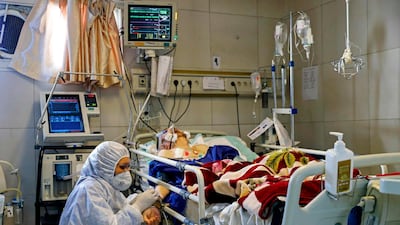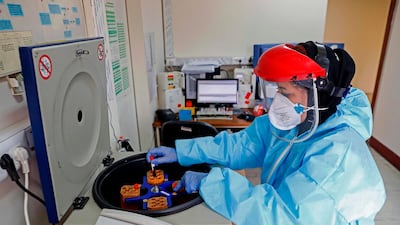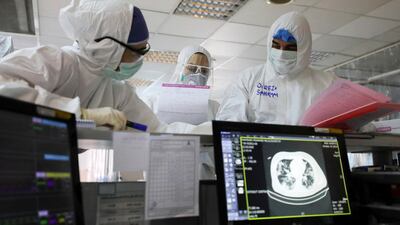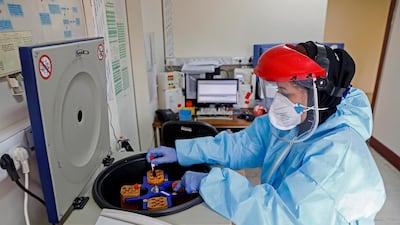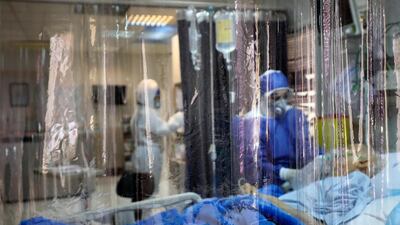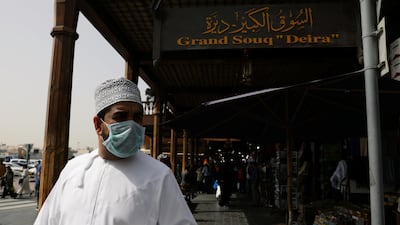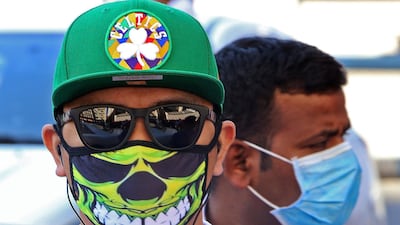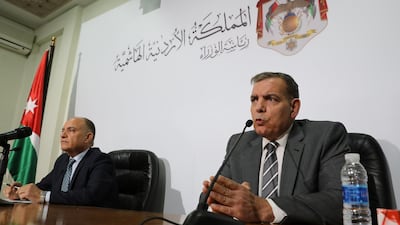At least 23 Iranian MPs and the country’s head of emergency medical services are infected with coronavirus as the country grapples with a rapidly rising number of infections and the death toll hit 77.
The number of infections in Iran surged passed 2,330 on Tuesday as the semi-official Ilna news agency reported that emergency medical chief Pirhossein Kolivand’s “health is good and there is no need for concern."
Iranian media reported that 23 of the country’s 290 MPs have so far tested positive for coronavirus. Several senior Iranian officials have tested positive for the virus in the worst-hit country outside China where it was first detected.
Masoumeh Ebtekar, vice president for women and family affairs and a spokeswoman for the 1979 hostage-takers, and Iraj Harirchi, the deputy health minister tasked with managing Iran's response to the outbreak are among those who tested positive.
As it deals with the response, Iran’s supreme leader put the Islamic Republic’s armed forces on alert to assist health officials.
Ayatollah Ali Khamenei’s decision was announced after state media broadcast images of the 80-year-old leader planting a tree ahead of Iran’s upcoming arbour day, showing how concern about the virus now reaches up to the top of the country’s Shiite theocracy.
“Whatever helps public health and prevents the spread of the disease is good and what helps to spread it is sin,” Khamenei said, who has not worn gloves at past arbour day plantings.
After downplaying the coronavirus as recently as last week, Iranian authorities said on Tuesday they had plans to potentially mobilize 300,000 soldiers and volunteers to confront the virus. It wasn’t clear if Khamenei’s order would set them in motion helping sanitize streets, direct traffic and track possible contacts those ill with the virus had with others, as initially suggested.
There are now over 2,530 cases of the new coronavirus across the Mideast. Of those outside Iran in the region, most link back to the Islamic Republic.
Exerts expressed concern at the official numbers of infections that Iran reported over the last week as the relitivly low number of cases to deaths would have put the fatality of the virus significantly higher than global averages. US Secretary of State Mike Pompeo urged Iran to come clean about coronavirus and post the real numbers.
With the latest tally, the death rate is now around 3.3 per cent, still much higher than other countries. It suggests the number of infections in Iran may still be far greater than current figures show.
Iran stands alone in how the virus has affected its government, even compared to hard-hit China, the centre of the outbreak.
The death of Expediency Council member Mohammad Mirmohammadi on Monday makes him the highest-ranking official within Iran’s leadership to be killed by the virus. State media referred to him as a confidant of Khamenei.
The virus earlier killed Hadi Khosroshahi, Iran’s former ambassador to the Vatican, as well as a recently elected member of parliament.
On Tuesday, lawmaker Abdolreza Mesri told Iranian state television’s Young Journalists Club program that 23 members of parliament had the coronavirus. He urged all lawmakers to avoid the public.
“These people have a close relationship with the people and they carry different viruses from different parts of the country, which may create a new virus, so we recommend the lawmakers to cut off their relationship with the public for now,” Mr Mesri said.
An activist group also said Tuesday that Wikipedia’s Farsi-language website appeared to be disrupted in Iran after a close confidant to the supreme leader died of the new coronavirus.
The advocacy group NetBlocks linked Mirmohammadi’s death to the disruption, though Iranian officials and its state media did not immediately acknowledge it. Authorities face increasing criticism from the Iranian public over the outbreak amid concerns the number of cases from the virus may be higher than currently reported.
NetBlocks described the disruption to accessing Farsi Wikipedia as being nationwide, saying its technical testing suggests the online encyclopaedia is being blocked by the same mechanism used to block Twitter and Facebook. Those social media websites have been banned since Iran’s disputed 2009 presidential election and Green Movement protests.
Some Iranians said they couldn’t access Wikipedia’s Farsi website since Monday night. Others said they could, including through the site’s mobile-friendly pages.
“The new restrictions come as Iran faces a growing crisis following the loss of senior state figures to coronavirus and a spate of criticism and misinformation have spread through social media,” NetBlocks said in its analysis.
The Wikimedia Foundation, which oversees the volunteer-edited encyclopaedia, did not immediately respond to a request for comment. NetBlocks previously reported internet disruptions affecting Iran in recent days and users across the Islamic Republic have reported problems.
The disruption raises fears of Iran potentially shutting off the internet entirely again, as it did for a week during economic protests in November. Iran separately has created its own so-called “halal” net of government-approved websites.

